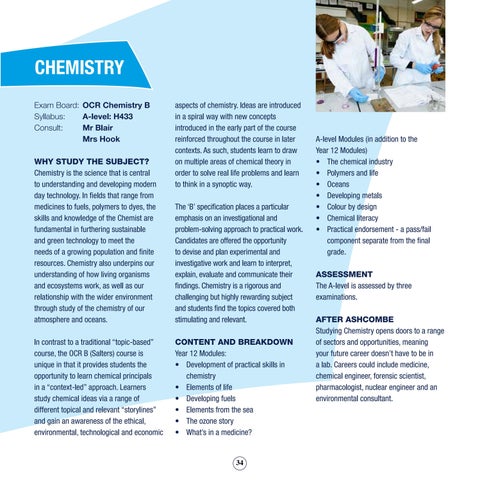CHEMISTRY Exam Board: OCR Chemistry B Syllabus: A-level: H433 Consult: Mr Blair Mrs Hook WHY STUDY THE SUBJECT? Chemistry is the science that is central to understanding and developing modern day technology. In fields that range from medicines to fuels, polymers to dyes, the skills and knowledge of the Chemist are fundamental in furthering sustainable and green technology to meet the needs of a growing population and finite resources. Chemistry also underpins our understanding of how living organisms and ecosystems work, as well as our relationship with the wider environment through study of the chemistry of our atmosphere and oceans. In contrast to a traditional “topic-based” course, the OCR B (Salters) course is unique in that it provides students the opportunity to learn chemical principals in a “context-led” approach. Learners study chemical ideas via a range of different topical and relevant “storylines” and gain an awareness of the ethical, environmental, technological and economic
aspects of chemistry. Ideas are introduced in a spiral way with new concepts introduced in the early part of the course reinforced throughout the course in later contexts. As such, students learn to draw on multiple areas of chemical theory in order to solve real life problems and learn to think in a synoptic way. The ‘B’ specification places a particular emphasis on an investigational and problem-solving approach to practical work. Candidates are offered the opportunity to devise and plan experimental and investigative work and learn to interpret, explain, evaluate and communicate their findings. Chemistry is a rigorous and challenging but highly rewarding subject and students find the topics covered both stimulating and relevant. CONTENT AND BREAKDOWN Year 12 Modules: • Development of practical skills in chemistry • Elements of life • Developing fuels • Elements from the sea • The ozone story • What’s in a medicine? 34
A-level Modules (in addition to the Year 12 Modules) • The chemical industry • Polymers and life • Oceans • Developing metals • Colour by design • Chemical literacy • Practical endorsement - a pass/fail component separate from the final grade. ASSESSMENT The A-level is assessed by three examinations. AFTER ASHCOMBE Studying Chemistry opens doors to a range of sectors and opportunities, meaning your future career doesn’t have to be in a lab. Careers could include medicine, chemical engineer, forensic scientist, pharmacologist, nuclear engineer and an environmental consultant.































